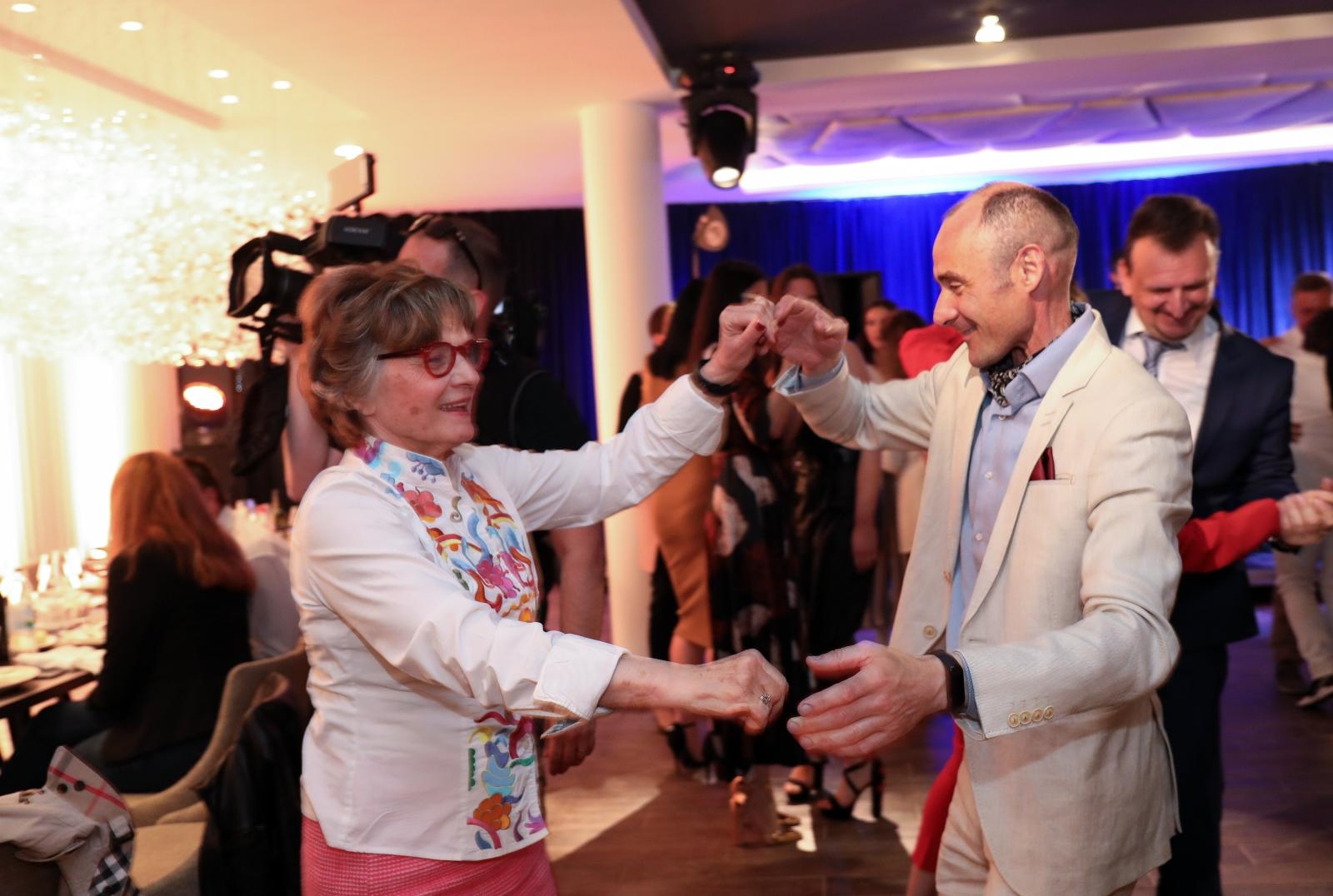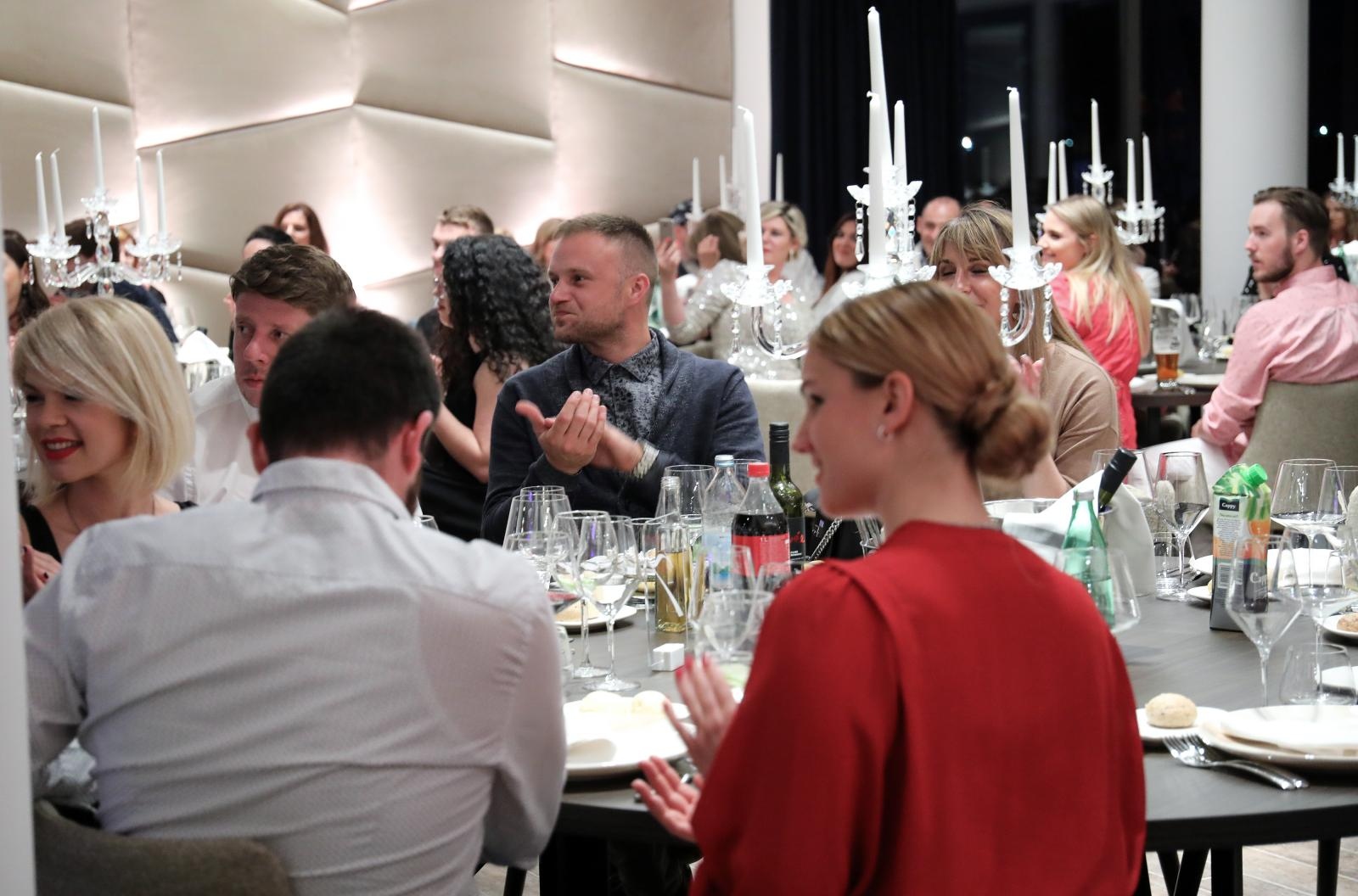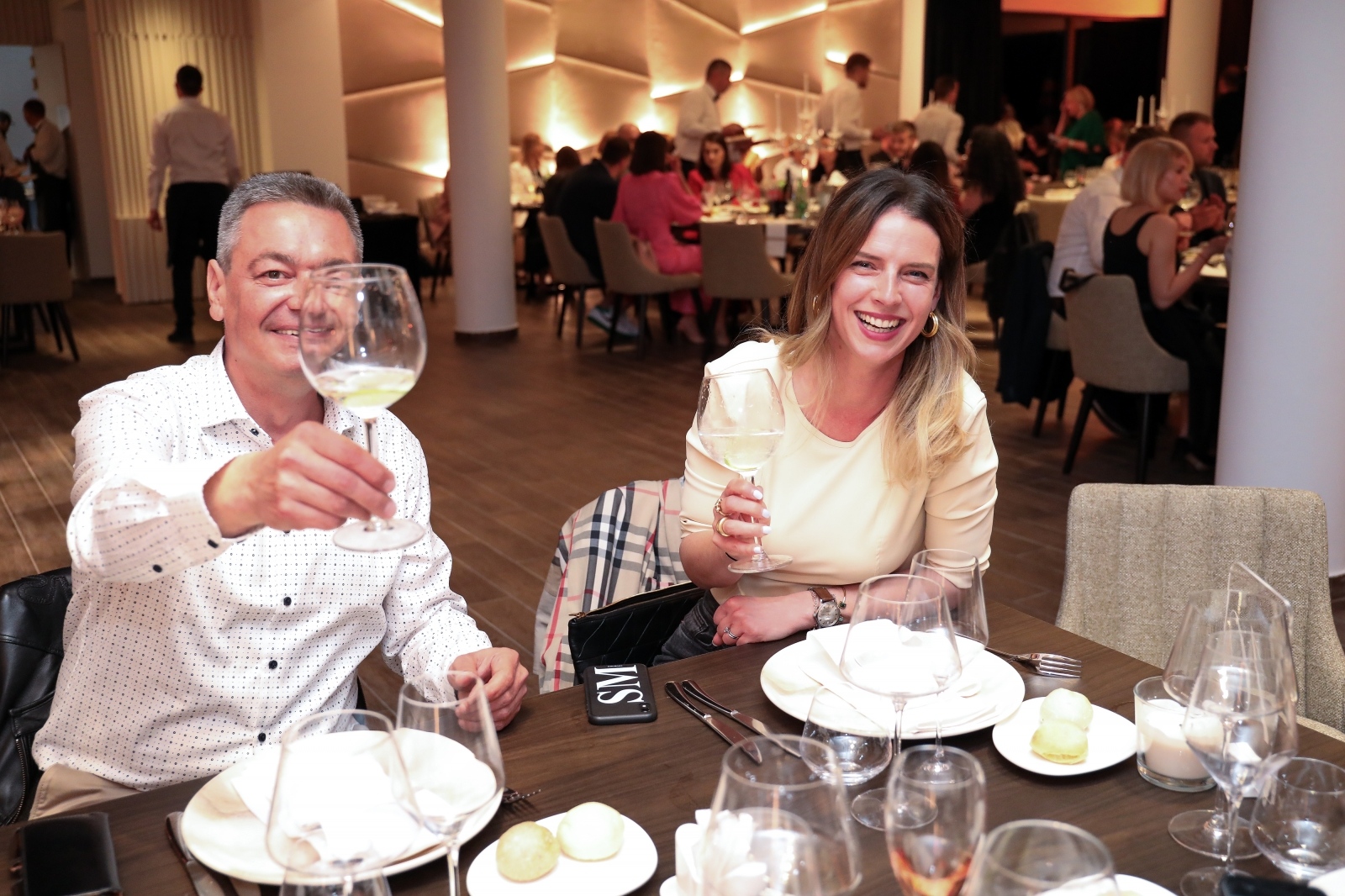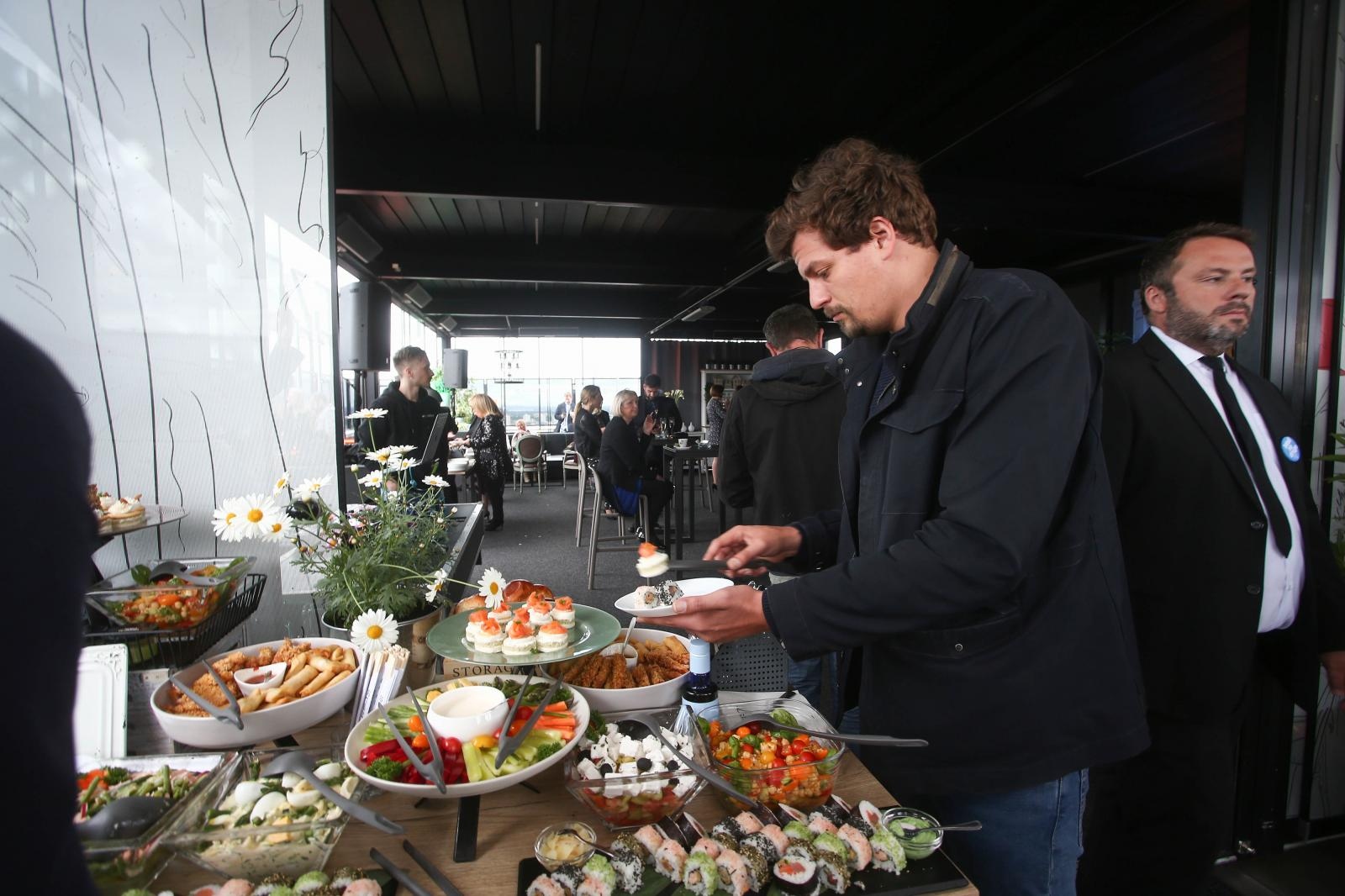Markotić Believes Epidemiological Restrictions will be Relaxed
ZAGREB, 16 May, 2021 - The head of Zagreb's "Dr. Fran Mihaljević" Hospital for Infectious Diseases, Alemka Markotić, believes that epidemiological restrictions will be relaxed and that gatherings with a larger number of people will probably be allowed but stresses the importance of vaccinating as many people as possible.
The number of new infections has dropped over the past week at a rate of almost 40%, the number of hospitalisations and patients on ventilators has been falling as well, but the clinical symptoms of the hospitalised patients are still rather serious, Markotić said in an interview with Croatian Television on Saturday.
"We must take care not to destroy the current positive trends, but I believe that epidemiological restrictions will gradually be relaxed," she said.
She noted that a fourth wave of the epidemic was possible in the autumn, noting that among those who were being hospitalised were also young and middle-aged people, between 50 and 60 years old.
Asked if she believed that Croatia would achieve the plan of having 55% of the adult population vaccinated by the end of June, Markotić said that the vaccination trends were excellent.
"We all sincerely hope that we will manage to reach that percentage. That also depends on the health system, which is doing its best to help step up the vaccination process," she said.
She also commented on the need for an additional campaign to encourage people who are still undecided about whether to get vaccinated or are waiting for the autumn to do it.
"It is already clear that the vaccine provides protection for a period of up to six months, or up to a year. To wait for the autumn means to expose yourself and people close to you to the risk of infection, even if it is only a less serious form of the disease. Even mild cases of the disease have serious side effects, not to mention the possibility of returning to a normal life. The tourist season is ahead, we should not allow a repeat of last year and the tourist season ending as early as 15 August. How we will do this year is up to us," Markotić said, calling on all to get vaccinated as soon as possible.
Asked when the pandemic could end, Markotić said that epidemiologists expected it to be put under control by next spring on the condition a large share of the world population gets vaccinated.
For more news about COVID-19 in Croatia, follow TCN's dedicated page.
Croatia Logs 480 New Coronavirus Cases, 21 Deaths
ZAGREB, 16 May, 2021 - In the past 24 hours 480 coronavirus cases and 21 COVID-19 deaths have been registered in Croatia, the national COVID-19 response team said on Sunday.
There are 6,232 active cases and 1,675 hospitalised patients, including 181 on ventilators, while 20,160 people are self-isolating.
To date 350,390 people have been registered as infected, the death toll is 7,708 and 336,450 people have recovered, including 1,113 in the past 24 hours.
To date 1,927,262 people have been tested for the virus, including 6,946 in the past 24 hours, and 1,346,991 vaccines have been administered, with 1,039,233 people receiving the first shot and 307,758 both.
For more info about COVID-19 in Croatia, follow TCN's dedicated page.
Post-Covid Wedding Pilot Party in Croatia Held with 130 Maskless Guests
May 16, 2021 - The first post-Covid wedding pilot party in Croatia was held on Saturday in Zagreb with 130 maskless guests.
Jutarnji List reports that on Saturday night, after more than a year, wedding guests hugged, danced, kissed, and enjoyed fine food and drinks with the hope that in one week, they will all test negative and thus prove that such celebrations can take place without any problems.
The president of the Independent Association of Caterers, Žaklina Troskot, opened the "wedding ceremony" on Saturday night at the Riverside Golf Club in Zagreb. It is an experimental gathering organized by the association in cooperation with the Croatian Institute of Public Health and the National Civil Protection Headquarters.

Emica Elvedji / PIXSELL
About 130 participants gathered for the ceremony. Ladies wore formal gowns, men donned suits, and the band “Prava Stvar” dusted off famous hits. As the organizers said, everything was done to simulate a real wedding ceremony as we were used to in the time before the coronavirus pandemic. There were no masks, no social distancing, or any measures, but the rules for entering the most anticipated “wedding” of the year were rigorous. Only those who have been vaccinated with both doses, have recovered from the coronavirus, or have a recent negative test for coronavirus could enter the wedding hall. Journalists also had to take the test to maintain maximum safety.

Emica Elvedji / PIXSELL
The wedding menu was also festive. Guests were served Dalmatian prosciutto as an appetizer, accompanied by a selection of homemade cheeses and salamis, smoked tuna salad, spring rolls, and sushi. This was followed by gorgonzola with marinated peaches, pears, nuts, baby octopus salad with vegetables, Istrian olives and cheese, a selection of salads, rump steak, and homemade baked štruklji. Among the main dishes were pork rolls stuffed with bacon, forest fruit sauce with homemade gnocchi, chicken medallions in panko crumbs with risotto, and roasted veal "ala peka" with potatoes and vegetables all finished with desserts.

Emica Elvedji / PIXSELL
Among the guests was a prominent Zagreb doctor Dr. sc. Damir Eljuga, who has recovered from the coronavirus. He expressed hope that this is just one “pilot event” that gives us all hope that we will return to normal life. Of course, he said, provided we all get vaccinated to “beat this unfortunate disease.”
A member of the band "Prava Stvar" also addressed the press, saying that he was delighted that the band could perform at a wedding like this after a long time.
"Prava Stvar has not performed since September 2020, but if we take into account that the corona has been going on for more than a year, we are talking about fifty canceled weddings and other events. This resulted in a large financial loss and a drop in revenue of about 80%, which is not reflected only in the band's six members, so we are talking about twenty people who were greatly affected by the coronavirus and inability to play. I must mention that some of us are only engaged in this business and have no other income, so they had to start doing other jobs to survive. When I talk about these fifty lost opportunities/gigs, I also mean abroad, such as Austria, Germany. In Slovenia, too, we were supposed to be engaged in several wedding ceremonies. To add that this band has been performing for twenty years, it’s our anniversary soon. We all love it very much, we love music, it fulfills us, and that is our way of life. We really miss gigs, and we can't wait for everything to return to normal so that we can start living, working, and functioning as we used to. I am very proud that our band Prava Stvar was chosen for this pilot project and that we have the opportunity to participate in it, it means a lot to us, and I hope that we will return to the old way soon," he said.
The organizers hope the project will be successful. This will be evidenced by negative tests after a week, given that all participants in both events, as they agreed, will be tested for the coronavirus. If everyone is negative, they hope that this kind of study will open the door to a return to wedding halls, banquets, and the way of life we are all used to.
The president of the Troskot Association said she was extremely pleased with the project.
"After a very successful first pilot project held on Thursday, which more than 80 people attended, tonight was the second pilot project to show that wedding ceremonies are safe. Three groups of guests are present: those who have recovered, have been vaccinated, and have been tested. Tonight, this is a simulation of a real wedding only without the bride and groom, but with a rich dinner and the performance of a live band," she said in conclusion.
For all, you need to know about coronavirus specific to Croatia, including travel, border, and quarantine rules, as well as the locations of vaccination points and testing centers up and down the country, make sure to bookmark our dedicated COVID-19 section and choose your preferred language.
Number of People Vaccinated Has Surpassed One Million, Says PM
ZAGREB, 15 May 2021 - The number of people vaccinated against COVID-19 in Croatia has surpassed one million today, Prime Minister Andrej Plenković tweeted on Friday, calling on all citizens to be vaccinated so that the pandemic could end.
He thanked healthcare workers, the Croatian Institute of Public Health, the Health Ministry and all services "who are working daily on the implementation of the vaccination plan," he said.
"I call on everyone to be vaccinated as it's the safest and fastest way to end the pandemic," he added.
For more about Covid-19 in Croatia, follow TCN's dedicated page.
Croatia Logs 826 New Coronavirus Cases, 23 Deaths
ZAGREB, 15 May 2021 - In the past 24 hours 826 coronavirus cases and 23 COVID-19 deaths have been registered in Croatia, the national COVID-19 response team said on Saturday.
There are 6,886 active cases and 1,684 hospitalised patients, including 185 on ventilators, while 21,468 people are self-isolating.
To date 349,910 people have been registered as infected, the death toll is 7,687 and 335,337 people have recovered, including 1,131 in the past 24 hours.
To date 1,920,316 people have been tested for the virus, including 7,322 in the past 24 hours, and 1,310,456 vaccines have been administered, with 1,009,609 people receiving the first shot (30% of the adult population) and 300,847 both.
For more about Covid-19 in Croatia, follow TCN's dedicated page.
Croatia's Coronavirus Update: 926 New Cases, 41 Deaths, 1,537 Recoveries
ZAGREB, 14 May, 2021 - In the last 24 hours, of 6,587 tests performed for coronavirus, 926, that is 14%, have returned positive, the national COVID-19 crisis management team reported on Friday.
In the last 24 hours there have been 41 more deaths linked to COVID-19, bringing the COVID-related death toll to 7,664.
There are currently 7,214 active cases of whom 1,752 infected patients are receiving hospital treatment, including 207 patients placed on ventilators.
Since 25 February 2020, when Croatia's health authorities confirmed the first registered case of the infection with the novel virus, more than 1.91 million tests have been conducted.
As many as 334,206 patients have recovered to date, including 1,537 recoveries in the last 24 hours.
Currently 21,530 people are self isolating.
More than 1.26 million vaccine doses against COVID have been administered in Croatia since the beginning of this year. Over 980,000 people have been given at least one shot, and more than 288,000 have received both shots of the two-dose vaccine.
For more about Covid-19 in Croatia, follow TCN's dedicated page.
First Post-Covid Pilot Party in Croatia Held, Digital Green Certificates on Schedule for June 1
May 14, 2021 - The first post-Covid pilot party in Croatia took place in Zagreb at the Rooftop Lateral restaurant.
Last night, the first pilot project of a private business event in Zagreb was held, reports HRTurizam.
This is the first event in Croatia, which aims to prove that the event is safe and, in fact, represents a step towards the old normal. About ninety guests gathered to participate in this kind of research. The initiator of the project is the Independent Association of Caterers, with the great support of the Croatian Civil Protection Headquarters and the Croatian Institute of Public Health.
The President of the Association, Žakline Troskot, points out that the project has been prepared since March this year and they are very proud that their idea has been realized. All participants have been vaccinated twice, and after a week, they will undergo testing. "If the results are favorable, catering will return to normal soon, as well as other related industries, which have suffered great losses since some of them have been closed for 15 months," said Troskot.

Matija Habljak / PIXSELL
Croatian Institute of Public Health epidemiologist, Ph.D. Dijana Mayer emphasized the importance of vaccination because a large percentage of vaccinated citizens will greatly simplify life and enable events to take place and much greater mobility of people.
Epidemiological constraints have made life difficult for many, and a particularly vulnerable group is the hospitality industry. The decline in turnover in the hospitality industry in the first four months of 2021 compared to the same period in 2019 is 55.5%.
The event industry has been declining by 90% since the beginning of the pandemic. Last year alone, more than 100 festivals were canceled, attracting about a million visitors from all over the world to Croatia every year. Namely, according to Unison's research, this industry accounts for 6.3% of Croatia's GDP and employs about 17,000 people. Only 50-60% of companies and employees involved in events until the pandemic will remain.

Matija Habljak / PIXSELL
Many newlyweds dream of lavish weddings with live music, which they have not been able to hold in the last 15 months. Provisional statistics from the Central Bureau of Statistics show that the restriction of gatherings has greatly affected the holding of wedding ceremonies.
Often unpredictable circumstances in 2020 influenced couples and their decision to hold wedding ceremonies and, in general, enter into a marital union. Data for all 12 months show that in 2020 the total number of marriages decreased by 22.9% compared to the previous year, i.e., 4,972 fewer marriages were concluded. In Croatia, we have more than 300 catering houses and about as many wedding halls. The sector employs more than 12 thousand people, which makes this figure twice as high when we consider the whole range of related activities involved in organizing a wedding, from planners, decorators, florists, musicians, photographers, and others.
On Saturday, the second pilot project will be held in Zagreb's Riverside Golf Club - a simulation of a wedding ceremony with a live performance by a band, which is expected to have more than 100 participants. Unlike the first, three groups of guests are participating in Saturday's event - vaccinated, tested (the day before at the CNIPH), and people who have already recovered from COVID-19.
Like the first group, the guests from the wedding ceremony will be tested a week after the event. The favorable outcome of both tests will certainly be a step towards the old normal and the possibility of opening catering and other industries while respecting certain conditions defined by the Civil Protection Headquarters of the Republic of Croatia.
Minister of Health Vili Beroš reported on Thursday at the 57th session of the Government of the Republic of Croatia that almost 29 percent of the adult population has been vaccinated with one dose and eight percent with both doses of the Covid-19 vaccine.
A total of 1,571,650 doses of vaccine have arrived in Croatia so far, and more than 1,230,000 doses have been consumed since the beginning of vaccination, said Beroš, adding: “We are recording a promising trend of fewer newly infected people."
Deputy Prime Minister Božinović announced a possible easing of epidemiological measures as of June 1.
"Given that the number of coronavirus patients has been declining in recent days, appropriate preparations are being made for a possible easing of epidemiological measures from June 1, so pilot projects of various events will be implemented in the coming days," Božinović said.
One week after the events, participants will be tested by PCR tests at the CNIPH, and if it turns out that there was no transmission of the infection, ways to relax measures for such events will be considered, Božinović said.
Božinović reported that Croatia was the first member of the European Union to successfully conduct a pilot test of the digital green certificate system, the so-called Covid passport.
"AKD (Agency for Commercial Activity), which is in charge of developing the technical solution, successfully performed testing with a central digital gateway, and it was confirmed that all key components of the Croatian system are functional and ready to start issuing certificates announced for early June," he said. Božinović added that the system successfully generates QR codes for all three types of certificates - on vaccination, testing, and recovery, and the exchange of public keys with other member states through the EU accession, since an application was made to verify certificates of other countries.
The government's working group will define business rules for issuing certificates to citizens, harmonize the visual identity of certificates with EU requirements, prepare communication and information materials, and other technical matters regarding the application of certificates, Božinović added.
For all, you need to know about coronavirus specific to Croatia, including travel, border, and quarantine rules, as well as the locations of vaccination points and testing centers up and down the country, make sure to bookmark our dedicated COVID-19 section and choose your preferred language.
Vili Beros: That "So Long, Corona" Moment is Edging Ever Closer
May the 14th, 2021 - Croatian Health Minister Vili Beros has assured the public that with the vaccination rollout becoming more and more successful across the country, that much anticipated moment at which we say so long to the coronavirus pandemic is edging ever closer.
As Poslovni Dnevnik writes, Health Minister Vili Beros said at a government session held on Thursday that so far, almost 29 percent of the Croatian adult population has been vaccinated with a single dose, and eight percent of those people have been vaccinated fully, meaning that they have received both doses of one of the vaccines effective against the novel coronavirus, SARS-CoV-2.
A total of 1,571,650 doses of vaccine have arrived in the Republic of Croatia so far, more than 46,000 doses were administered on the 12th of this month, and more than 1,230,000 doses have been administered since the start of the vaccination rollout which began earlier this year, Vili Beros said.
"We're recording a promising trend and increasing the number of vaccinated people, as well as significantly fewer newly infected people. The daily report on the number of infected people shows that people continuously place their trust in trust the profession,'' he said.
''Mass vaccination points across the country are an indicator of the organisation, unity and efficiency of the Croatian healthcare system,'' said Vili Beros, before thanking all of the vaccinators and volunteers in the field making sure the pandemic comes to an end as soon as possible.
"On the eve of the arrival of summer holidays, with each additional dose, we're closer to the circumstances that we can say 'so long, corona' (adio korona) according to the action soon to take place of the same name, which will take place in the City of Split in two days," concluded Vili Beros.
For all you need to know about coronavirus specific to Croatia, including travel, border and quarantine rules, as well as the locations of vaccination points and testing centres up and down the country, make sure to bookmark our dedicated COVID-19 section and choose your preferred language.
Croatia Reports 1,064 Coronavirus Infections, 34 Deaths
ZAGREB, 13 May, 2021 - In the past 24 hours 1,064 coronavirus cases and 34 deaths have been registered in Croatia, the national COVID-19 crisis management team said on Thursday.
The number of active cases stands at 7,866, including 1,837 hospitalised patients, 202 of whom are on ventilators.
To date Croatia has registered 348,158 coronavirus cases and the death toll stands at 7,623.
A total of 1,906,407 people have been tested to date, including 7,501 in the past 24 hours.
A total of 332,669 people have recovered, including 1,281 in the past 24 hours.
Currently 23,316 people are in self-isolation.
For more about COVID-19 in Croatia, follow TCN's dedicated page.
Public Health Institute's Ivana Pavic Simetin Talks "Covid Passports"
May the 13th, 2021 - Ivana Pavic Simetin of the Croatian Institute of Public Health has discussed what so-called ''covid passports'' will mean for people in practice for those who have been fully vaccinated, only had one dose, or have proof of their recovery from the disease.
As Poslovni Dnevnik writes, the current situation with the coronavirus pandemic was commented on for HRT by the Deputy Director of the Croatian Institute of Public Health, Ivana Pavic Simetin, epidemiologist Ozren Polasek and the Chief of the Istrian Civil Protection Directorate, Dino Kozlevac.
“Mortality is always late in relation to the incidence of the disease, so the number of falls in mortality isn't so obvious, although we can see it in some indicators. The incidence of the disease has definitely been declining since April the 18th when things peaked and when we had more than 530 daily average cases of infection per million inhabitants. Yesterday that number stood at 320, so we're recording a continuous decline,'' said Ivana Pavic Simetin.
"This shows that the measures are working and that we're preparing well for the tourist season," noted Ivana Pavic Simetin, adding that the death rate will also begin to fall.
She said that Croatia's position when it comes to vaccination against the novel coronavirus with both doses of AstraZeneca vaccine hasn't changed and that, as we also reported, there will be enough for both doses despite the EU's contract with AstraZeneca expiring.
"The interval is twelve weeks between the two doses of vaccination with the AstraZeneca vaccine, which has allowed us to vaccinate people with the first dose of this vaccine from February until now, there are only a few people who have already been vaccinated with two doses of this vaccine," she said.
“The situation has been stable for several weeks now, with a constant decline. But we aren't entirely happy with the situation, people with severe symptoms still end up in the hospital and this burdens our system. We had 80 people in hospital recently. Mortality is present almost daily. Things are going well, but we mustn't give in to pressure and open up again too soon, that's the only danger. We believe that things will be okay in June and July,'' said Dino Kozlevac, adding that the situation with vaccination in Istria is good.
"The interest has been great from the beginning and it's only growing every day. As of two days ago, we vaccinated about 50,000 people with the first dose and about 13,000 people with the second dose. The organisation works perfectly at 11 points for mass vaccination, and the action of vaccinating tourist workers is underway,'' said Kozlevac.
“Last week, 17,798 doses arrived and all of them were administered. We're satisfied and that's the key, I expect that in the coming weeks we will vaccinate 50 percent of the adult population and that's the right path to go down,'' he added.
Epidemiologist Ozren Polasek tried to explain what is being achieved by these rehearsal events and gatherings.
"Here we can obtain the most interesting information about how the virus spreads in more or less controlled conditions. Namely, when you find someone who tests positive, you can only ask them about who they've been exposed to in the past, and they might not remember everyone. At these experimental gatherings, we're primarily interested in how much two doses of the vaccine protects a person, because autumn and next year depend on that,'' said Polasek.
"In the case of recovery from the disease, covid passports are valid for six months, in case of vaccination, they have no expiration date,'' he added.
Ivana Pavic Simetin says that we currently have three components of the so-called covid-passports - vaccination, recovery and negative PCR or antigen test.
"As for vaccinations, for now these passports don't have a shelf life, but in case of recovery following contracting the actual illness, they're valid for six months," she added.
For all you need to know about coronavirus specific to Croatia, including travel, border and quarantine rules, as well as the locations of testing centres and vaccination points across the country, make sure to bookmark our dedicated COVID-19 section and select your preferred language.


